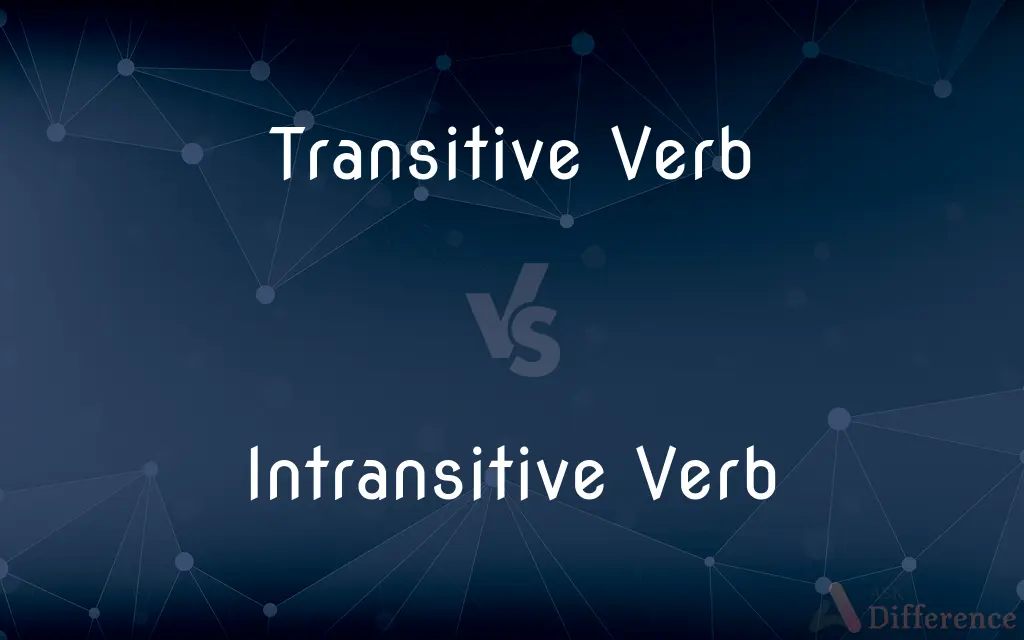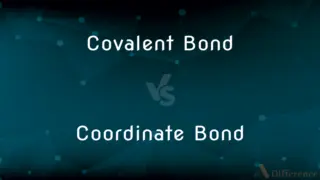Transitive Verb vs. Intransitive Verb — What's the Difference?
By Tayyaba Rehman — Published on January 3, 2024
Transitive verbs require a direct object to complete their meaning; intransitive verbs do not.

Difference Between Transitive Verb and Intransitive Verb
Table of Contents
ADVERTISEMENT
Key Differences
Transitive Verb: A verb that requires a direct object to express a complete action. For example, "She reads a book." The action 'reads' needs the object 'book'. Intransitive Verb: A verb that doesn't require a direct object. In "She sleeps," the action 'sleeps' is complete without an object.
Transitive Verb: Can often be followed by a noun or pronoun serving as a direct object, like "He kicked the ball." Intransitive Verb: Typically stands alone or followed by adverbs or prepositional phrases, as in "He runs quickly."
Transitive Verb: Crucial for sentences where the action is being done to someone or something. "She painted the picture." Intransitive Verb: Indicates an action that is contained to the subject, as in "She laughed."
Transitive Verb: Often changes form when in passive voice, like "The ball was kicked by him." Intransitive Verb: Cannot form a passive voice, as there is no object to become the subject.
Transitive Verb: Can ask "what?" or "whom?" after the verb to find the object, as in "They ate what? - Lunch." Intransitive Verb: Asking "what?" or "whom?" doesn’t make sense, as in "She smiled at what?"
ADVERTISEMENT
Comparison Chart
Direct Object
Requires a direct object
Does not require an object
Sentence Structure
Followed by noun/pronoun
Stands alone or with adverbs/prepositions
Action Direction
Action directed at an object
Action contained to the subject
Passive Voice
Can be used in passive voice
Cannot form passive voice
Question Test
"What?" or "Whom?" finds object
"What?" or "Whom?" doesn't apply
Compare with Definitions
Transitive Verb
Verb where action transfers to an object.
He kicked the ball.
Intransitive Verb
Verb with action not transferring to an object.
He laughs.
Transitive Verb
Verb directly affecting something/someone.
She touched the fabric.
Intransitive Verb
Verb that doesn't answer "what?" or "whom?"
The sun rose.
Transitive Verb
Verb completing its meaning with an object.
They watched the movie.
Intransitive Verb
Verb complete without a direct object.
The baby cried.
Transitive Verb
Verb requiring a direct object.
She drank the water.
Intransitive Verb
Verb often followed by adverbs or prepositions.
She danced gracefully.
Transitive Verb
Verb that answers "what?" or "whom?"
He called his friend.
Intransitive Verb
Verb functioning independently of objects.
Birds migrate.
Common Curiosities
How can I identify a transitive verb?
If you can ask "what?" or "whom?" after the verb and get an object, it’s transitive.
Do intransitive verbs have indirect objects?
No, they don't have direct or indirect objects.
What is a transitive verb?
A verb that requires a direct object to complete its meaning.
Can a verb be both transitive and intransitive?
Yes, some verbs can be used both ways depending on context.
What defines an intransitive verb?
A verb that doesn’t need a direct object to be complete.
Why can’t intransitive verbs form passive voice?
There's no object to become the subject in the passive form.
Can context change a verb’s transitivity?
Yes, the context and usage can affect whether a verb is transitive or intransitive.
How does object presence affect verb transitivity?
The presence or absence of a direct object determines transitivity.
Are all action verbs transitive?
No, many action verbs can be intransitive.
Is 'laugh' a transitive or intransitive verb?
It’s typically intransitive, as it doesn't need an object.
Can transitive verbs be followed by prepositions?
Yes, but the preposition isn't part of the direct object.
Do intransitive verbs express complete action?
Yes, their action doesn't transfer to an object.
Can transitive verbs stand alone without an object?
No, they need a direct object to make sense.
What are examples of intransitive verbs?
Verbs like "sleep," "sit," or "arrive" are often intransitive.
Can a verb's transitivity vary in different languages?
Yes, verb transitivity can vary across languages.
Share Your Discovery

Previous Comparison
Phototrophs vs. Chemotrophs
Next Comparison
Covalent Bond vs. Coordinate BondAuthor Spotlight
Written by
Tayyaba RehmanTayyaba Rehman is a distinguished writer, currently serving as a primary contributor to askdifference.com. As a researcher in semantics and etymology, Tayyaba's passion for the complexity of languages and their distinctions has found a perfect home on the platform. Tayyaba delves into the intricacies of language, distinguishing between commonly confused words and phrases, thereby providing clarity for readers worldwide.














































